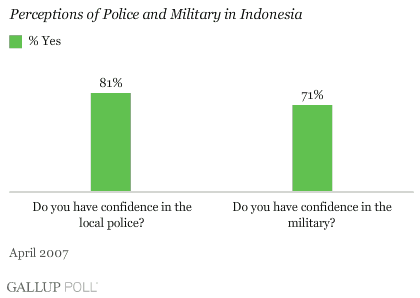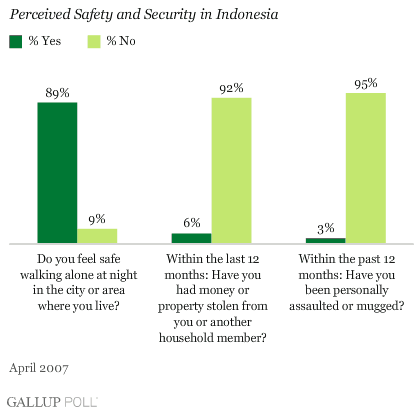WASHINGTON, D.C. -- Reforms in Indonesia over the past decade appear to be having a positive effect, especially for the nation's police force. According to Doug Ramage, the Asia Foundation's country representative in Indonesia, the military -- which played a primary role in politics during President Suharto's three decades of authoritarian rule -- was always more popular than the police. Since Suharto's resignation in 1998, the police's official separation from the military and significant reforms seem to have changed that dynamic. ���۴�ýfinds that 81% of Indonesians say they have confidence in the local police, compared with 71% who say the same for the military.

Police Reform
At an Oct. 25, 2007, presentation at the Henry L. Stimson Center in Washington, D.C., Ramage reported noticeable changes since a massive overhaul of the country's police force began several years ago. Ramage says that under Suharto's reign, police were primarily charged with maintaining internal security by monitoring citizens' actions; fighting crime was far less important. When an officer of the law would investigate a crime, the officer would often bear the costs associated with it, leading many to ask civilians for money. This, coupled with the well-known brutality inflicted upon new cadets, who then in turn unleashed the same brutality on civilians, gave the police of Suharto's era a reputation for corruption and violence.
Much has changed since then. According to Ramage, recent community-oriented policing reforms have fostered greater understanding between the people and the police by bringing both sides together in a regular, open forum. Citizens are able to inform police of criminal activities in their communities, while police have been able to dispel myths about their practices and showcase their reforms, most notably the overhaul of the cadet curriculum. No longer beaten in an effort to make them tougher, cadets are now trained with an international standard human rights curriculum at a bachelor's degree level. And a standard operating budget for all police activities, though meager, has been implemented.
Security
Ramage's assessment that the situation has improved coincides with ���۴�ýpolling in Indonesia, which finds Indonesians expressing a great sense of personal security from crime. Nearly 9 in 10 (89%) Indonesians say they feel safe walking alone at night. Only 6% say they have had money or property stolen from themselves or a member of their household in the past year, and just 3% have been personally assaulted or mugged in that same period.

Although public opinion is quite positive, Ramage stresses that reforms are still in their infancy. Police oversight is still nonexistent, and 86% of the population still considers corruption widespread throughout the government. But the effects of the reforms are being felt and should have positive momentum.
Survey Methods
Results are based on face-to-face interviews with 1,000 adults in Indonesia, aged 15 and older, conducted April 2007. For results based on the total sample of national adults, one can say with 95% confidence that the maximum margin of sampling error is ±3 percentage points. In addition to sampling error, question wording and practical difficulties in conducting surveys can introduce error or bias into the findings of public opinion polls.
